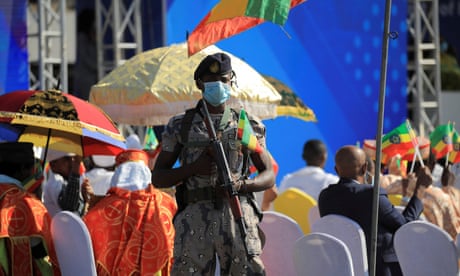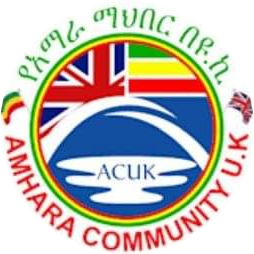Residents say attack on town square in Finote Selam targeted ethnic Fano militia but civilians were also hit
An airstrike on a busy town square in Ethiopia’s Amhara region has killed at least 26 people, in the latest instance of violence in Ethiopia’s second-biggest state, where militia have been fighting the army.
The attack occurred in the early hours of Sunday morning in Finote Selam, a town in Amhara’s West Gojjam zone, a local doctor told the Guardian.
It is not clear how many of the victims are civilians. Residents said the attack targeted members of the Fano ethnic militia who had gathered in the town centre, but added that several bystanders were also hit.
Hospital officials told the Guardian that 26 people had died and at least 50 others were wounded, making the attack one of the deadliest single episodes since violence erupted across Amhara in early August.
Fano militia have seized control of several towns across Amhara, raising fears of another war in northern Ethiopia, just nine months after a ceasefire ended a brutal two-year conflict in the neighbouring Tigray region.
The militia sprung inmates from prison, trashed government offices and looted weapons from police stations. The government responded by declaring a state of emergency and turning off the internet.

Tanks rolled through major towns, including the regional capital, Bahir Dar, and artillery was used in civilian neighbourhoods. In several places, the security forces fired on people who were blocking roads. The authorities have not commented on how many civilians were killed.
After a week of fighting, the government said on Wednesday that it had reclaimed control of Amhara’s towns and promised that services would restart, although observers fear Fano now plans to wage a guerrilla campaign.
Clashes continue to be reported in some rural areas.
Amhara forces fought alongside federal troops in the Tigray conflict, seizing several disputed territories, but the relationship broke down in April, when the government announced a plan to integrate regional forces into the military.
The Amhara, who are Ethiopia’s second biggest ethnic group, say their voices were not heard in the peace deal that ended the conflict. They fear their new, hard-won territories may be returned to Tigray.
In late April, unidentified gunmen, who are believed to have been Fano militia members, shot dead the head of the local branch of the ruling Prosperity party. In June, the government said it had killed 200 “extremists” during a shootout at a remote monastery. Activists say clergy were among the dead.
This month’s unrest prompted the state carrier, Ethiopian Airlines, to suspend flights, and foreign governments warned their residents to shelter in place as regional government officials and members of parliament fled.
On Friday, the UK and US, among other countries, said they were concerned by the violence and urged a peaceful solution. The World Health Organization and Save the Children have warned the violence is disrupting humanitarian operations in Amhara.
Ethiopia’s parliament was due to vote on the state of emergency on Monday. The measures ban public gatherings and allow the police to detain suspects without a court order.
The state-appointed human rights commission said on Monday that it has received credible reports of civilian deaths this month. It also said there had been “widespread arrests of civilians who are of ethnic Amhara origin” under the emergency rules in Addis Ababa, the capital.
The authorities reject allegations that they are conducting mass arrests. On Saturday, a government statement said only 23 people had been arrested in Addis Ababa under the state of emergency, including a prominent opposition politician.

